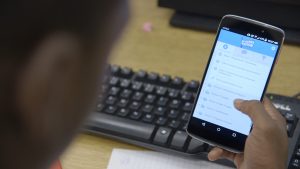A federally funded research project brings innovation to Algebra Nation, a mathematics online learning system used by more than 250,000 students and 10,000 teachers annually across the state of Florida. Algebra Nation provides free, anytime access to state standards-aligned instructional videos, live homework help and practice test questions to prepare students for the End-of-Course exam, a test that Florida students must pass in order to graduate from high school.
The Virtual Learning Lab, funded by the U.S. Department of Education’s Institute of Education Sciences, is relying on the collaboration of nationally acclaimed researchers to evaluate Algebra Nation and its effects on students’ overall performance in Algebra I. Algebra I is considered the “gatekeeper” course that students must master in order to be successful in advanced STEM courses and careers. Algebra Nation was developed at the University of Florida College of Education by the Lastinger Center in partnership with Study Edge, an educational technology company based in Gainesville.
“We have seen how popular Algebra Nation has been in Florida,” said Dr. Philip Poekert, assistant director of the Lastinger Center and the Virtual Learning Lab project director. “But the real question is, is it actually helping students build their math skills?”

Algebra Nation, a mathematics online learning system used by more than 250,000 students and 10,000 teachers annually across the state of Florida.
The project consists of three research teams, each investigating different features of Algebra Nation. The first team, based from the University of Colorado-Boulder, analyzes overall student engagement within the platform. Another team, based out of UF’s College of Education, will enhance the practice test section by creating a complex algorithm that will deliver questions based on the student’s overall mastery of the concept.
The third team, led by Dr. George Michailidis, director of the UF Informatics Institute, has analyzed data from more than 80,000 students across the state. Their research has found that in the 2015-2016 school year, students who utilized Algebra Nation more than five times throughout the year received significantly higher scores on the EOC exam than non-users who were matched on factors such as prior achievement, demographics, district characteristics and teacher years of experience.
“The results show that using Algebra Nation is actually effective, whether it’s used by students who are struggling or students who are doing well already,” said Sahba Akhavan, an advanced graduate research assistant at the Informatics Institute.
Although the Informatics team has concluded their first round of research, they are continuing to use the data to find ways to improve Algebra Nation.
At the moment Algebra Nation is a self-guided learning platform. Students can choose from five instructors to guide them through instructional videos and can opt to complete different sets of practice test questions to check their understanding.
But Carole Beal, UF Education Technology professor and the Virtual Learning Lab principal investigator, wants to create a more customized learning platform–one that will provide students with a tailored learning experience based on the performance of students in previous years.
“Our team is using informatics to study students of similar learning levels and backgrounds to create a formula that will guide individual students through their optimal recommended learning path,” Beal said.
In January, Study Edge will release a new version of Algebra Nation to a pilot group of about 20 Algebra I teachers and their students in Alachua County.
The difference–the new platform will utilize complex algorithms to provide students with a personalized study plan that recommends the appropriate steps for each student. “We will use a statistical model to predict if a student will pass the EOC based on the student’s usage of the system and then recommend specific actions to help him or her succeed,” said Akhavan.
Students’ performance on the EOC in May will tell the team if they are on the right track in making Algebra Nation more personalized.
The Virtual Learning Lab project is funded by a 5-year $8.9 million grant from the Institute of Education Sciences. For more information on the Virtual Learning Lab and the ongoing findings of the project, please visit www.virtuallearninglab.org or by email at vll@coe.ufl.edu.
SOURCE: Phil Poekert, poekert@coe.ufl.edu; 305-586-8665
Carole Beal; crbeal@coe.ufl.edu; 352-273-4178
George Michailidis; gmichail@ufl.edu; 352-392-1582
Sahba Akhavan; sahbaakn@ufl.edu
MEDIA CONTACT: Kevin Coulson, communications office, UF College of Education; kevincoulson@coe.ufl.edu; 352-273-4370




